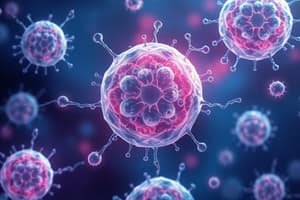Podcast
Questions and Answers
What are specialized cells?
What are specialized cells?
Cells designed to carry out a certain role with specific components and a specific structure.
What is an egg cell?
What is an egg cell?
The female sex cell made in the ovaries and released during the menstrual cycle.
How is an egg cell adapted to its role?
How is an egg cell adapted to its role?
The nucleus contains genetic material and the cytoplasm contains nutrients for the embryo to grow.
What is a sperm cell?
What is a sperm cell?
How is a sperm cell adapted to its role?
How is a sperm cell adapted to its role?
What is a red blood cell?
What is a red blood cell?
How is a red blood cell adapted to its role?
How is a red blood cell adapted to its role?
What is a white blood cell?
What is a white blood cell?
How is a white blood cell adapted to its role?
How is a white blood cell adapted to its role?
What is a nerve cell?
What is a nerve cell?
How is a nerve cell adapted to its role?
How is a nerve cell adapted to its role?
What is a muscle cell?
What is a muscle cell?
How is a muscle cell adapted to its role?
How is a muscle cell adapted to its role?
What is a fat cell?
What is a fat cell?
How is a fat cell adapted to its role?
How is a fat cell adapted to its role?
What is a ciliated cell?
What is a ciliated cell?
How is a ciliated cell adapted to its role?
How is a ciliated cell adapted to its role?
Study Notes
Specialized Cells Overview
- Specialized cells are designed to perform specific functions in the body.
- These cells have unique structures and components that enable them to carry out their roles effectively.
Egg Cell
- The female sex cell produced in the ovaries, released during the menstrual cycle.
- Combines with sperm during fertilization to form an embryo.
- Contains a nucleus with genetic material and cytoplasm filled with nutrients to support embryo growth.
Sperm Cell
- The male sex cell created in the testes after puberty.
- Joins with an egg during fertilization to create an embryo.
- Features a tail for movement, high mitochondrial content for energy, and a nucleus housing genetic information.
Red Blood Cell
- Cells present in the blood responsible for transporting oxygen throughout the body.
- Contains hemoglobin for oxygen transport.
- The disc shape enhances surface area for maximum oxygen absorption; lacks a nucleus, allowing greater oxygen capacity.
White Blood Cell
- Part of the immune system, these cells help combat infections and diseases.
- Possess an irregular shape to squeeze through blood vessel walls to reach infection sites.
- Some can alter shape to encapsulate and destroy pathogens.
Nerve Cell
- Transmits electrical signals within the nervous system.
- Long and thin structure facilitates message transmission over long distances.
- Features branched connections for efficient communication and is insulated by a fatty myelin sheath to speed up signal transmission.
Muscle Cell
- Cells that form muscles in the body, found in bundles.
- Capable of contraction and relaxation to enable movement.
- Includes various types such as cardiac muscle (heart), skeletal muscle (attached to bones), and smooth muscle (e.g., stomach lining).
Fat Cell
- Stores energy as fat.
- Can expand to accommodate more fat storage and contains minimal mitochondria, reflecting low energy requirements.
- Provides soft elastic padding to protect organs.
Ciliated Cell
- Located in airways to help move mucus and dust out, and in oviducts to transport egg cells from the ovaries to the uterus.
- Characterized by tiny hair-like structures called cilia that beat rhythmically to facilitate movement.
Studying That Suits You
Use AI to generate personalized quizzes and flashcards to suit your learning preferences.
Related Documents
Description
This quiz covers the essential functions and characteristics of specialized cells, including egg cells, sperm cells, and red blood cells. Understand how these cells are uniquely structured to fulfill their roles in the body, from reproduction to oxygen transport. Test your knowledge on the different types of specialized cells and their significance.




